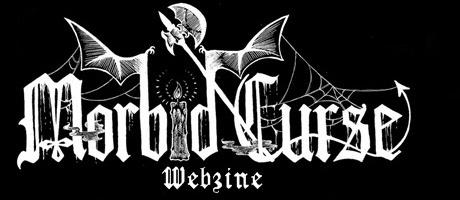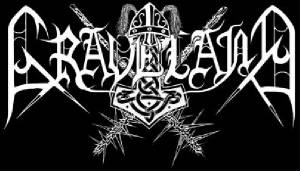
|

|

Graveland's fifth demo, In the Glare
of Burning Churches, is one of the more grim and raw efforts from this Polish band. Released on cassette, in May 1993,
it has been reissued on tape and CD, several times. Over the years, some extra songs have been added, though this is hardly
a major selling point, as superior versions can be found on The Celtic Winter. Had
it not been made available on CD, there would really be no reason to ever track this down and listen to it. It is not particularly
impressive, though it is not bad for what it is.
I was much more into this 'album' when I first obtained it, as I was
quite disappointed with everything else that I had heard by the band, other than The Celtic
Winter and Carpathian Wolves. It was nice to be able to go back and hear more
raw black metal with Graveland's trademark approach, actually being able to enjoy the band again by going back in time. I
recall listening to it over and over, while studying in the bleak winter months. However, after that initial period, it has
done little more than collect dust.
The material on this demo should sound familiar with anyone that has heard the
aforementioned releases. A few of the same songs are present, though the atmosphere is a little different. This is due to
the performance and production. This may be the band's most raw effort, next to The Celtic
Winter. The main difference is that the sound is quite flat, particularly
the drums. The lack of reverb makes for an entirely new listening experience. The rhythms are a little boring as well, though
this is not a huge deal. Overall, the songs are lacking in conviction and passion, doing very little to create atmosphere
outside of the various samples of flames and winds. The keyboards also attempt to make up for the weak riffs, but to little
or no avail. Most of the songs are mid-paced and one-dimensional, failing to keep the listener's attention for very long.
The musicianship is very sloppy and the songwriting is uninspired, for the most part. Though one might be tempted to write
this off as a third-rate tribute to Norwegian black metal, Graveland's music actually possesses a character of its own. While
many of the elements may sound familiar to fans of Darkthrone, Emperor and Burzum, the actual execution is done in such a
manner as to not really sound like any of those bands.
In the Glare of Burning Churches
is not essential, but offers a decent slab of raw black metal that should appeal to anyone that found themselves disappointed
with everything after Carpathian Wolves. It may end up being little more than a novelty,
but fans of early Graveland should give it a shot.
(19 Feb. 2012)

The Celtic Winter is the
sixth demo release from the Polish black metal band, Graveland. It has been issued in various forms, as a cassette demo, an
MCD and even on CD as a full-length. While many consider this 1994 album to be the band's first L.P., it is not officially
so. Regardless of this, it stands as Graveland's finest release and the most valuable musical contribution Rob Darken made
to the black metal scene.
"The Gates to the Kingdom of Darkness" was the first Graveland song I ever heard, and I
immediately likened it to Burzum, for some reason. This is one of the better songs that the band has ever recorded and it
gave me somewhat of a wrong impression, as far as this band was concerned. It created expectations that I don't think they
ever managed to live up to, which is a shame since the band has put out some decent stuff.
Musically, this comes off
as owing a lot to the Norwegian black metal scene. In some ways, it gives the impression of being what Emperor would sound
like without all of the synth overpowering the mix. Thankfully, the guitars are the most dominant instrument, as they should
be. However, the music is rather bare and the riffs are not all that memorable. There are no icy cold tremolo riffs, which
may be disappointing for some. The band appears to shine the most during the slower sections, which are sometimes accompanied
by bits of keyboard effects. This is done to assist with creating a dark and obscure atmosphere, though it does not fully
live up to its potential. The drumming is a little annoying, at times, including some strange polka beats. As for the vocals
are in the typical style of the era, not really standing out from the rest of their peers, but suiting the music just fine.
The album flows well enough, beginning with a brief intro and a couple faster-paced songs. Due to the awkward nature
of the playing, it never really seems to fully accomplish what it is aiming for, but the results aren't bad. Things slow down
a bit near the middle and then, after a short interlude, the final pieces are at a much slower tempo, more suitable for a
funeral. Highlights include "The Night of Fullmoon" and "The Return of Funeral Winds". While it does not match up to many
of the other albums released that year, such as Transilvanian Hunger, Hvis Lyset Tar Oss, or Pentagram, The
Celtic Winter is a solid album and a good representation of what Graveland was all about.
(5 Sept. 2011)

Carpathian Wolves is the
first full-length album from Graveland, though The Celtic Winter contains just about
as much actual music and possesses a higher sound quality. Released in December 1994, this record seems to represent a step
backward and bears a number of weaknesses.
Musically, this effort leaves a lot to be desired. The riffs are, often,
ineffective and forgettable. The drumming is very sloppy and continues to include very non-metal patterns that kill the atmosphere,
at times. The vocals are decent, neither exceptionally good nor bad. There is an over-reliance on synth to carry the atmosphere
of the album and that is one of the worst elements of Carpathian Wolves. Some of
the passages are interesting and add to the horror vibe that is often present, but then the band gets carried away and fails
to stop while they are ahead. The intro and outro are too long, as well. There are a number of good guitar melodies on this
album, but they suffer from poor execution and the overall rotten production. That is the most frustrating thing about this
release; every song bears some positive qualities and one can see a decent amount of potential, but the sloppy drumming and
bad sound just prevent this from being what it could have been. Despite all of this, the morose open-arpeggio chords of "Witches
Holocaust" and the cold tremolo melodies of "Unpunished Herd" manage to stand a little bit above the rest.
This entire
endeavour was neutered, right from the start, due to the horrid production. The guitars are incredibly weak and pushed to
the background, which serves as a death sentence. If it is not bad enough that the synth overpowers everything else, even
the drumming is much higher in the mix than the guitars. This should never have been released, in this form. The guitars are
always supposed to be the focal point. Had the mix been corrected, Carpathian Wolves would
have been a much better album. Even the boring and uninspiring riffs could be overlooked, as there really is enough good material
to make this a worthy effort.
Graveland's debut L.P. is rather disappointing, but not without any positive qualities.
This was but the misstep down a path that would take the band very far from the promise that they displayed on The Celtic Winter. For less picky listeners, Carpathian Wolves is
still worth checking out, but be warned that it is inferior to its predecessor in all ways.
(30 Nov. 2011)

Graveland's second full-length album, Thousand Swords, was released by Lethal
Records in late 1995. The band's sophomore effort follows down the same path begun by Carpathian Wolves, which is not
meant as a compliment. Rob Darken was in a position to ensure that Polish black metal was taken seriously, yet through various
Graveland releases and other bands that he had taken part in, he seemed only to do a lot of damage to the scene.
The
first thing that must be addressed here is the horrific production. There is no way that anyone with a fully functioning brain
could possibly have thought that this sounded good enough to be released to the public, and yet it was. This is not bad in
an under-produced, necro demo sort of way; it is just weak as hell, in every imaginable way. From the opening moments of "Blood
of Christians on my Sword", one is appalled by the weak and ineffectual tone of the guitar. It is so thin and harmless that
one is sickened by the choice that was made here. Bback metal was never defined by its heaviness and a thin, sharp guitar
tone is to be expected in many cases, but this is taking it to a new extreme. The guitars sound about as menacing as the fluttering
of a butterfly's wings. Compared to Carpathian Wolves, even the drums sound softer and more tame. black metal is supposed
to sound dark, evil and threatening; instead, this comes off as rather timid and frightened of its own shadow.
As for
the compositions, themselves, Thousand Swords offers more of the same mediocre songwriting as was heard on the previous
album. Somehow, whatever spark of brilliance that illuminated Darken's mind as he was creating The Celtic Winter never
returned and he found himself struggling to put together even the most basic black metal songs. For the most part, this sounds
like rehash of past glories, only done in less convincing fashion. Many of the tracks sound as if they were cut and pasted
together from random riffs, with odd transitions that make little sense to the overall flow of the songs. The utter inconsistency
of the songwriting is most clear on "Born for War", which randomly shifts from fast tremolo melodies to slower sections and
then back to mid-paced riffs that don't quite fit with the rest. It jumps around, from one to the other, with a total absence
of logic. The fast-paced sections seem to be tossed in there in an obligatory manner, serving no real purpose to the overall
structure of the song. For the most part, the faster melodies are totally devoid of any real atmosphere. The few times that
one does get a sense of the epic atmosphere that Graveland is going for here, it results from the overbearing keyboards rather
than the actual instruments, which is another problem that this band always seemed to suffer from. Even at times when the
guitar riffs seem to build a little momentum, the synth and percussion work together to crush them back into the dirt and
they are rendered useless.
The most unfortunate part of Thousand Swords is that is had potential. It didn't
have to end as the weak, shoddy disappointment that it is. Graveland was a decent band that should have done so much more.
With a recording like The Celtic Winter to their credit, it is an utter shame that they were never able to follow up
and fulfill the promise that it showed. While Thousand Swords is not the most horrid piece of trash ever recorded and
might actually be palatable to those less-critical listeners, it is a complete mess when compared to the aforementioned demo.
Listen at your own risk.
(2 Sept. 2012)
|

|

|






